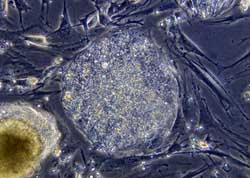STEM CELL ISSUE
|
There is so much of life that I just don't get. This is especially true with things emanating from Washington. In the run-up to the two national political conventions and the fall elections with all the security issues surrounding them, the Senate spent time debating an amendment banning gay marriage. It was as if they had nothing else to do for that week. I might have missed something, but the missions in Iraq and Afghanistan aren't yet accomplished. Osama bin Laden, Mullah Omar, and Abu Musab al-Zargawi are still at-large and presumably planning attacks against us and others. In addition, we are on alert for terrorist attacks from big cities like Washington and New York to our local shopping malls. Whether some homosexuals want to get married and enjoy the legal status accorded heterosexuals isn't going to hurt anyone and prohibiting them with a constitutional amendment shouldn't be job #1 in Washington. However, Washington's ban on funding stem cell research is another story; it is a life and death issue. Stem cell research promises potential breakthroughs for a myriad of deadly diseases. The urgency of this research hit home emotionally with the recent death of former President Reagan. I'm missing something in this discussion about the funding ban. Why won't the administration fund stem cell research? Had stem cell research been given top priority years back, Reagan's tragic last decade might have been averted and Superman might have flown again. Being Scottish and therefore somewhat frugal when it comes to conserving assets, I don't get the ban. One of the sources for stem cell research is leftover embryos that had been created for in vitro fertilization. A number of eggs are inseminated and produce embryos. A couple of the embryos are used for insemination while the remainder are frozen for possible future use by the couple if the first attempt doesn't result in a pregnancy. If a pregnancy results, the unused embryos remain frozen in liquid nitrogen...doing nothing. However, at some point in time, these unused embryos will be destroyed. What is morally wrong or unethical about using these unused embryos for stem cell research and for a possible cure for a host of ailments-one of which might kill you or one of your loved ones? I don't get it. The source for millions of stem cells are being kept in frozen animation while lives are being ruined or lost from the scourges of a multitude of maladies. The administration doesn't want to "kill" an embryo that if used might, in nine months, produce a human life. It should be noted that these embryos are being relegated to an Artic-like existence until someone unceremoniously discards them in an incinerator, because they aren't needed for procreation. However, they are needed and needed now for stem cell research. Since America is a secular nation with the separation of church and state clearly defined, if not always evenly applied, we need to find a non-religious basis for making policy decisions that have for some a moral or ethical component. One religiously neutral standard is that of the great German ethicist, Immanuel Kant. In his Categorical Imperative, he states that when making a moral decision, "Primum non nocere." (Translation: "First, do no harm.") This is often used by those against stem cell research, but it can be employed more effectively in defense of this research. The moral dilemma is framed today between those that wish to protect the potential for human life by denying the potential for curing medical problems of presently alive and suffering people. Kant, who died exactly two centuries ago, warned, "First, do no harm." Isn't the federal ban on stem cell research first doing real harm to living and suffering millions while protecting frozen embryos that will never be used? I don't get it, and I bet the families of Reagan and Superman don't get it either. Further, I bet that you or your family would get it if you or your family could have had a chance to be spared by research that is stalled by the present administration. It is funny how we see moral issues more clearly when they hit home. A stem cell filled with potential promise. This article appeared in the Dixon Telegraph on 9/22/04.
|







